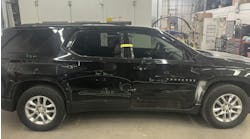There’s a photo of an estimator sitting in his chair at the front counter of a body shop. He’s dead-eyed, stiff, utterly unenthused about being at work and helping others.
The photo is, to say the least, unflattering, unbecoming and completely unrepresentative of Maurice Carpenter’s personality—which is precisely why he keeps it at his desk.
The photo was taken back in 2008, a year when Carpenter was, as he admits, immature and self-consumed. And for Adrian Wright, owner of Wright One Paint and Body Shop in Augusta, Ga., that attitude wasn’t going to fly in her shop.
“He was not motivated, not willing to multitask. He didn’t have that type of get-up-and-go personality you need to have in this business,” Wright says. “No matter how much training and work you spend on people, if they’re not willing to work and improve themselves, it will affect your whole bottom line. So we let him go.”
Three years later, in 2011, Carpenter attended a cookout in Wright One’s parking lot a changed man. A husband and father, he impressed Wright with his changed, matured, self-effacing attitude. She took Carpenter—who wanted to prove that he could be a more focused, team-oriented employee—back as an estimator, and neither party has looked back since.
Now whenever Carpenter spots someone slacking or not being a team player, he pulls out that photo to remind them (and himself) how important it is to have a sense of purpose with your work, and how far a diligent, disciplined schedule can go in reducing stress. He’s using the lessons learned from his early years to make himself and his shop more organized and efficient today.
Wright One Paint and Body Shop
Location: Augusta, GA.
Size: 8,000 square feet
Staff: 10 (5 technicians, 2 service writers, 2 owners, 1 shuttle driver)
Average Monthly Car Count: 50
Annual Revenue: $1.8 million
My biggest problem in 2008 was letting the stress of the job get to me. The word “stress” is no longer in my vocabulary. Back then, I was constantly disorganized, selfish, and I was a bad communicator. I didn’t know how to organize my day, and stuff would always be piling up. And then I’d take that stress home with me. I really just wasn’t enjoying my job.
With growth, I’ve learned that I need to take steps to make work less stressful for me and everyone else. There are little things I do throughout my day that seem simple, but back then, I took them for granted. Now, if we make a mistake because of me, I’ll take the hit, but then it’s gone instantly. I figure out a way to solve the problem, and then I find a takeaway, a way to improve myself.
When I come in in the morning, the first thing I do is go over my list, which changes from day to day. It consists of all the jobs in the shop and on the lot. Each repair order has details on what needs to be repaired on each vehicle, the customer contact info and the insurance company I’m working with.
I then write out a game plan for the day and everything I need to get done. I’ve got different repairs with different insurance companies that have to go out on a certain date. I go through that list in the morning and figure out what’s most important and write out descriptions with pertinent information, like any parts we’re waiting on, if the customer has a rental car, when the car is expected to go out. Those descriptions need to be very detailed so that when I talk to the customer, the insurance company or my team, I have answers to questions.
Starting out, handling repairs through insurance companies was my biggest source of stress. I didn’t have repairs in full detail at the time, which meant I was always scrambling and disorganized. Now I map out my day with that game plan: “This adjustor needs to see the car before I proceed,” or “I can take photos and send it over to this insurance company.” Spending 30 minutes on my list each morning actually saves time in the end and makes everything easier.
Then I go out to my guys in the shop and go over that list. I’m letting them know what’s a priority, what’s got to go out that day. I’m also finding out what else needs to be done on any particular job from my end. It can be from me ordering a part to me contacting the insurance company.
I now have pretty good communication with all the guys in the shop, which I really wasn’t concerned about back then. The biggest thing I’ve learned is to ask questions. “What do you need from me? How can I help make this job easier for you?” Learning to listen has been huge, because these guys know things I don’t know and can help me just as much as I help them. Now it’s more about the team.
After that, I immediately go back to the front and address anything they need from me, which is usually ordering parts. Then I’m at the front counter for most of the day, writing estimates, taking phone calls and greeting customers that walk in.
My estimates have gotten a lot more thorough since I came back. I’ll never forget how it was before. You really shouldn’t be writing estimates stressed and in a hurry. When I was trying the first time, I had all this other stuff going on, and I wouldn’t spend the time making them detailed.
Now I go down, line for line, and make sure I’m providing as much detail as possible. Say there’s a repair at the center of the door and it’s a silver vehicle. Back then I would write “a door for repair,” and the repair probably wouldn’t have matched up to what it was supposed to be. I need to mention where on the door, the blend, the severity—all information that makes it easier for each step of the process. Seeing how easy it is now and thinking back to how hard I was making it back then is really crazy.
I usually see 10 to 15 customers per day. I’ve always been a good talker, and never really had a problem getting a conversation going with a customer. But before, I was more concerned with getting the information I needed, rather than listening and keeping them calm. The difference now is my mindset. Treating it as though it’s my car has shifted the way I talk to them. I’m not just going to repair it and give it back to them—I’m going to make sure they trust me.
The first thing I do is let them talk about the accident and vent as much as they need before I get into the stuff I need. Just asking questions about anything other than the repair process usually gets them talking, and we can work from there.
Then I try to gauge them: What are this person’s expectations of me and the shop? Because most people know nothing about the repair process and how long it takes. I need them to understand how long it takes, how often I’ll be contacting them, and what role they’ll play in the whole process. Then I start asking my questions about their insurance company, if they need to set up a rental, etc.
During the afternoon, I’ll go back out on the floor and see how repairs are going and take notes. I’ll go line for line through the estimate when a repair is done to make sure it’s truly ready for the customer.
Then I’ll spend a good part of the afternoon updating customers. I usually make five to seven calls per day, letting them know if the car is on pace for the day I originally promised, or if it’s ready right then and there. Again, thinking about it as my car, it helps put me in the right place for that call. These people need their cars and they want to be kept informed.
Before I leave for the day, I always go back over my list and make sure there’s nothing I missed, or if there’s anything that came up that I need to address the next morning. Sometimes someone will tell me something important, and next thing you know, you’ve got a customer standing in front of you, and then you write an estimate, and then you’ve got another customer, and you’ve forgotten all about that important thing.
There’s so much stuff going through your head throughout the day, and that quiet downtime at the end is important. It sets me up for the next day, and I’m not stressed as soon as I walk through the door.




